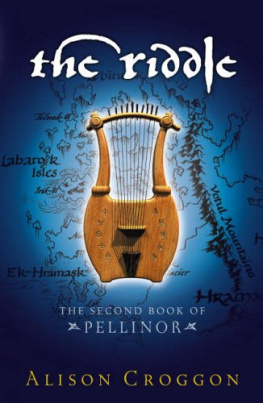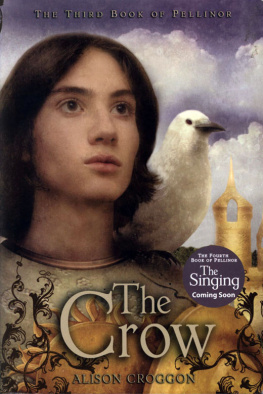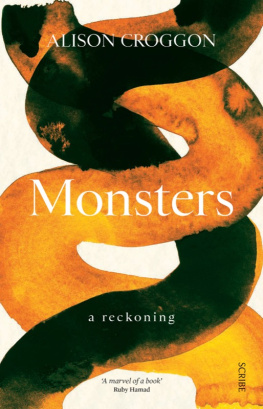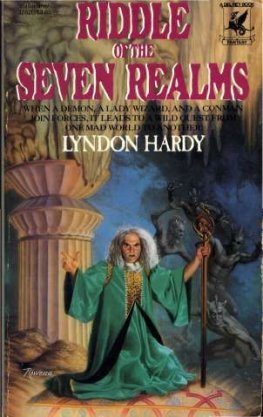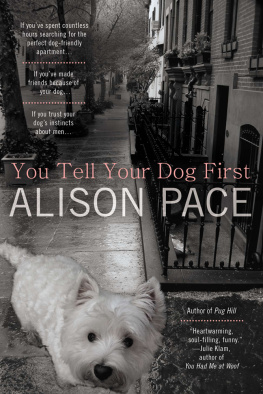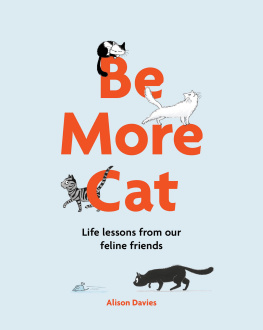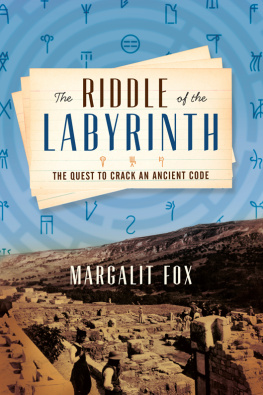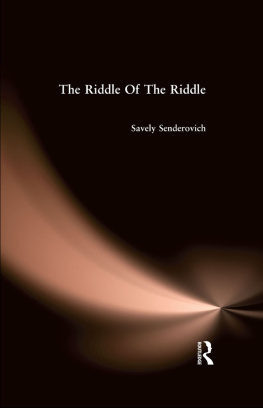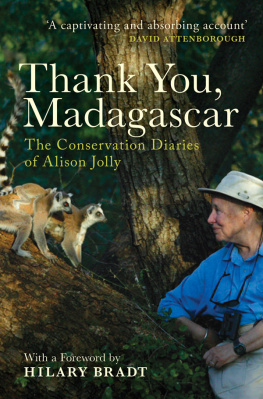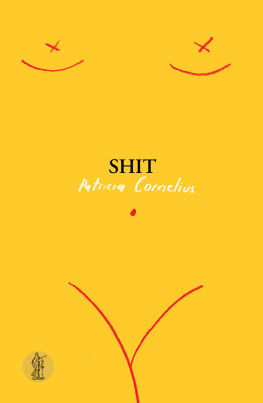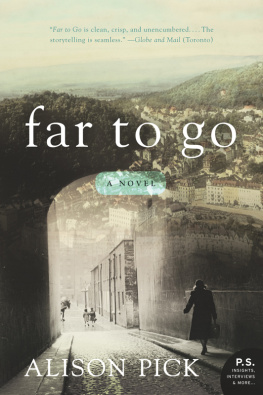Alison Croggon - The Riddle
Here you can read online Alison Croggon - The Riddle full text of the book (entire story) in english for free. Download pdf and epub, get meaning, cover and reviews about this ebook. year: 2006, publisher: Candlewick Press, genre: Art. Description of the work, (preface) as well as reviews are available. Best literature library LitArk.com created for fans of good reading and offers a wide selection of genres:
Romance novel
Science fiction
Adventure
Detective
Science
History
Home and family
Prose
Art
Politics
Computer
Non-fiction
Religion
Business
Children
Humor
Choose a favorite category and find really read worthwhile books. Enjoy immersion in the world of imagination, feel the emotions of the characters or learn something new for yourself, make an fascinating discovery.
- Book:The Riddle
- Author:
- Publisher:Candlewick Press
- Genre:
- Year:2006
- Rating:4 / 5
- Favourites:Add to favourites
- Your mark:
- 80
- 1
- 2
- 3
- 4
- 5
The Riddle: summary, description and annotation
We offer to read an annotation, description, summary or preface (depends on what the author of the book "The Riddle" wrote himself). If you haven't found the necessary information about the book — write in the comments, we will try to find it.
The Riddle — read online for free the complete book (whole text) full work
Below is the text of the book, divided by pages. System saving the place of the last page read, allows you to conveniently read the book "The Riddle" online for free, without having to search again every time where you left off. Put a bookmark, and you can go to the page where you finished reading at any time.
Font size:
Interval:
Bookmark:
Home@page { margin-bottom: 10.000000pt; margin-top: 10.000000pt; }

Home@page { margin-bottom: 10.000000pt; margin-top: 10.000000pt; }
THE RIDDLE
The Second Book of Pellinor
Alison Croggon
Home@page { margin-bottom: 10.000000pt; margin-top: 10.000000pt; }
One is the singer, hidden from sunlight
Two is the seeker, fleeing from shadows
Three is the journey, taken in danger
Four are the riddles, answered in treesong:
Earth, fire, water, air Spells you OUT!
Traditional Annaren nursery rhyme
Annaren Scrolls, Library of Busk
Home@page { margin-bottom: 10.000000pt; margin-top: 10.000000pt; }


Home@page { margin-bottom: 10.000000pt; margin-top: 10.000000pt; }
A NOTE ON THE TEXT
T he Riddle continues the translation of the Naraudh Lar-Chane (The Riddle of the Treesong), which I began with the first two books of this classic romance, published as The Naming. The response to The Naming has been most encouraging, and confirms my feeling that this major work of Annaren literature deserves a broader public. It speaks to a modem audience as much as it did to those nameless Annarens, now lost in the mists of time, for whom it was originally written.
In The Naming we are introduced to Maerad of Pellinor and Cadvan of Lirigon, and learn of Maerad's destiny as the Fated One and her unique Elemental heritage as she comes into her Gift as a Bard. The Riddle picks up from the events at the end of The Naming and, against the darkening background of the coming War of the Treesong, takes us on the second stage of Maerad's quest: that for the Riddle of the Treesong itself.
In The Riddle the quest moves outside Annar for the first time, and we encounter some of the broad cultural diversity of Edil-Amarandh. For the purposes of this translation, I have taken Annaren, the original language of the text, to be the equivalent of English. For the most part, I translate all Annaren into English, but otherwise have left other languages untranslated, although I hope the context makes their meanings clear.
The Riddle consists of Books III and V of the Naraudh Lar-Chane. I have preserved the general structure of the narrative, although I have found it necessary, in transposing this text from Annaren to modern English, to take some liberties: in particular, the divisions of books in the translation do not correspond to the divisions in the original text, and some sections have been rearranged or slightly extended. In my defense I will say that I have excised nothing and added little, making only such changes I deemed necessary, within my limited judgment, to give the narrative the immediacy it would have possessed in its own time. I hope the result does not displease. For those who are curious about the complex structures and tropes of the original story, I understand that Mexico's University of Queretaro Press, one of the leading patrons of this exciting field of study, has begun the massive task of preparing a fully annotated Annaren publication of the Naraudh Lar-Chane. Sadly, we will have to wait some time until this major project reaches completion, but such an investment of time and scholarship indicates the deep interest this field is now attracting.
As a convention, throughout The Riddle, I have used the Speech word Dhillarearen to refer to Named Bards with the Gift who have not been trained in the Schools of Annar, retaining the word Bard to refer specifically to Bards of the Schools. As those familiar with Annaren mores will be aware, people born with the Speech who did not gain their true or secret Bardic Name were unable to come into their full Gift and were considered unfortunate and, in some cases, dangerous individuals. However, there were many Dhillarearen in cultures outside Annar who did gain their true Names by other means, and were therefore able to access their full powers. Their mores and cultural assumptions were often very different from those taught in the Annaren Bardic traditions of the Balance and the Three Arts, and so it seemed useful to make a distinction between the different Dhillarearen in this way.
As before, I have included appendices with further information on the cultures of Edil-Amarandh, drawn from the ongoing translation of the Annaren Scripts after their spectacular discovery in Morocco in 1991. Annaren studies have grown exponentially since then, and now exist in almost every academic discipline. It is a full-time job simply to keep abreast of the latest discoveries in the field, and while I have attempted to the best of my ability to ensure that the information contained in the appendices is from the most recent scholarship available, I apologize in advance for any inaccuracies that may have resulted from my inadvertently overlooking an important new development. For the amateur reader, however, the definitive studies for those interested in the background of the Naraudh Lar-Chane remain Uncategorical Knowledge: The Three Arts of the Starpeople by Claudia J. Armstrong and Christiane Armongath's authoritative L'Histoire de l'Arbre-chant d'Annar.
As always, a work such as this translation owes much to the contributions of others, many of whom I am unable to name here. Above all, I need to thank my husband, Daniel Keene, who contributed his proofreading skills yet again and bore with patient good humor the myriad inconveniences of living with a translator obsessed with such a longterm project. My children, Joshua, Zoe, and Ben, demonstrated a similar grace. I also owe thanks to Richard, Jan, Nicholas, and Veryan Croggon, who read the rough drafts with attention and enthusiasm and whose encouragement has meant a great deal. My thanks are also due to Suzanne Wilson and Chris Kloet for their excellent counsel on all aspects of the text. Last, I wish to record my gratitude to Professor Patrick Insole of the Department of Ancient Languages at the University of Leeds, who has been unfailingly generous with his expertise on the Treesong and most kindly permitted me to publish parts of his monograph on the subject in the appendices.
Alison Croggon Melbourne, Australia
Home@page { margin-bottom: 10.000000pt; margin-top: 10.000000pt; }
A NOTE ON PRONUNCIATION
M OST Annaren proper nouns derive from the Speech, and generally share its pronunciation. In words of three or more syllables, the stress is usually laid on the second syllable: in words of two syllables (such as lembel, invisible) stress is always on the first. There are some exceptions in proper names; the names Pellinor and Annar, for example, are pronounced with the stress on the first syllable.
Spellings are mainly phonetic.
aas in flat; ar rhymes with bar.
aea long i sound, as in ice. Maerad is pronounced MY-rad.
aetwo syllables pronounced separately, to sound eye-ee. Maninae is pronounced man-IN-eye-ee.
airhymes with hay. Innail rhymes with nail.
au ow. Raur rhymes with sour.
eas in get. Always pronounced at the end of a word: for example, remane, to walk, has three syllables. Sometimes this is indicated with e, which also indicates that the stress of the word lies on the e (for example, ile, we, is sometimes pronounced almost with the i sound lost).
eathe two vowel sounds are pronounced separately, to make the sound ay-uh. Inasfrea, to walk, thus sounds: in-ASS-fray-uh.
eu oi sound, as in boy.
ias in hit.
Next pageFont size:
Interval:
Bookmark:
Similar books «The Riddle»
Look at similar books to The Riddle. We have selected literature similar in name and meaning in the hope of providing readers with more options to find new, interesting, not yet read works.
Discussion, reviews of the book The Riddle and just readers' own opinions. Leave your comments, write what you think about the work, its meaning or the main characters. Specify what exactly you liked and what you didn't like, and why you think so.

